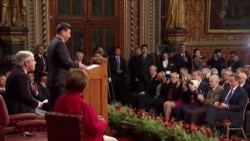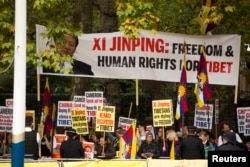Chinese President Xi Jinping addressed Britain's Parliament on Tuesday during a visit that the British government is touting as an opportunity for the two countries to boost trade and investment, while human rights advocates urge questions about China's human rights record.
“I am happy to have the opportunity to be here in the British Parliament, which is known as the mother of all parliaments, to meet the lawmakers,” Xi said in his address to the body, a rarity for foreign leaders.
Earlier in the day, Xi was greeted by Queen Elizabeth at Buckingham Palace during a lavish welcoming ceremony, and he was her guest for lunch.
His four-day trip also will include talks Wednesday with Prime Minister David Cameron, dinner at Cameron's country retreat, visits to businesses and other efforts to build relations with what China says is its best friend in the West.
The prime minister's office said this week some $46 billion worth of deals will be completed, and that Britain and China will also discuss cooperation related to the threat of terrorism and extremism.
Rights protests
But not all was friendly Tuesday, with Tibet activists and other opponents of the Chinese government holding demonstrations, and Chinese government supporters, mostly students, chanting to drown out the protests.
Human rights advocates are planning protests throughout Xi's visit and calling for Cameron to address China's human rights record with the Chinese leader. A spokeswoman for Cameron said Monday that "nothing is off the table."
The group Freedom Now, which represents detained Chinese Nobel laureate Liu Xiaobo and his wife, Liu Xia, released a letter Tuesday written by 12 fellow Nobel Peace Prize winners urging Cameron to call on China to set the pair free. The laureates, including Desmond Tutu and the Dalai Lama, also ask that Cameron push for Liu Xia to be allowed to travel abroad for medical treatment.
A matter of timing also presented a problem for Xi's visit. His trip began as Britain’s largest steel producer announced huge losses and more than 1,000 layoffs — largely blamed on a flood of cheap Chinese steel imports.
Some material for this report came from AP, AFP and Reuters.






